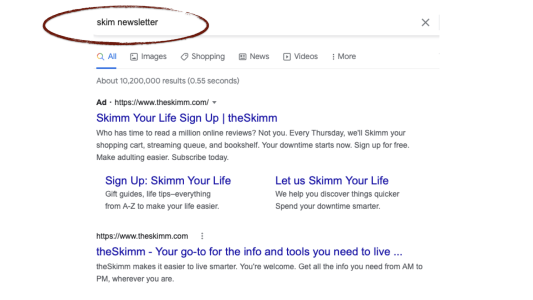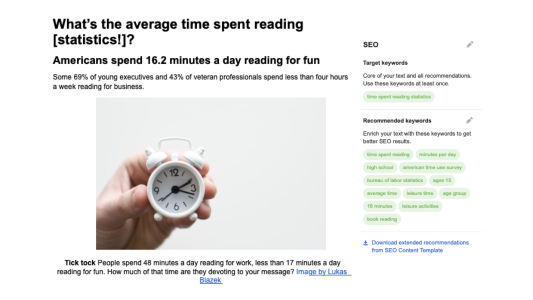Help web visitors find your page
Find out what your audience is looking for, choose the right keywords, optimize for mobile and otherwise help Google find you with these SEO guidelines for content writers.

How to find keywords
How do you find keywords and other search terms to help visitors find your webpage, blog post or news release? To find primary keywords for your press release, post or page:
1. Brainstorm. Writers know more about what their readers are looking for than most. That makes this a perfect step for writers to take the lead on SEO: Come up with the words or phrases you think your customers might use to search online for products and services like yours.
What do they want to know? According to Shel Holtz:
- 80% of the searches Google performs are informational: People are looking for answers to questions.
- 10% are navigational: People are trying to find a specific site, article or post.
- 10% are transactional: People are seeking information they need to buy a product or service.
But the words in your head might not be the words in your visitors’ heads. Online keyword research tools can help you find the words your potential customers really want.
2. Test terms with keyword-search tools. Now that you have your list of keywords, use online tools to test them. At Wylie Communications, we use SEMRush Keyword Magic. (We are not affiliated with SEMRush; we just love it.)
Whatever tool you use will help you gauge:
- Whether people are really searching for that term. Use the words in your target audience members’ heads, not the words in your head.
- Search volume and ranking factor. Your instinct might be to optimize for top-ranked terms. But unless you’re the Coca-Cola of your industry, those terms may be too competitive. You might wind up at the bottom of a long search engine results page or overspend to get to the top.
- Relevance. It’s more important than popularity. If the term is super relevant and modestly popular, use it. Search for long tail keywords and phrases that are more specific to your content.



3. Optimize for voice search. Hey Siri: Some 50% of searches are voice search these days, according to comScore. So optimize for voice search:
- Choose long-tail search terms. These days, web visitors don’t search for simple terms like “LAX flight delays.” Instead, they’re more likely to ask a longer, more conversational, more precise question: “Will Flight 457 on XYZ Airlines be delayed out of LAX?” Consider that when choosing your terms. Indeed, most searchers use three or more keywords in their searches, according to a study of 10 million U.S. internet users by Experian Hitwise.
- Ask questions. People tend to pose voice searches as questions: “Siri, what time is sunset today?” Find out what your audience is asking (on SEMRush, just click the Questions tab.) Then create pages, posts and other pieces with a popular question as the headline and its answer as the content.
- Explain how to. The number of how-to searches has increased by 70%. Search for “How to [your topic]” and choose the subjects your audience seeks help with. Use “How to [your topic]” for the headline, page title and page description.
- Use conversational keywords. People write more formally, but they speak more conversationally.


4. Check out the SERPs for your terms. Check out the neighborhood. You’ll learn:
- What Google people searching this term are really looking for. You don’t want to burn two hours writing a post about how people skim newsletters only to find out that those searchers are looking for theSkimm, the newsletter.
- What you can learn from the top-ranking pages. What other terms are they using? What’s missing?
- What gaps exist in the results. If you find a hole, fill it.
How to use keywords
You’re not still stuffing keywords, are you? If so, 1998 called; it wants its SEO back.
Early Google algorithms focused on keyword density — the percentage of keywords per 100 words on the page. But newer algorithms are more sophisticated: They seek to understand the searcher’s intent.
Each algorithm change — and apparently, Google changes its algorithm about three times a day — is meant to keep people like us from gaming the system so Google can deliver the very best result for each search.

Instead of keyword stuffing, use SEMRush SEO Writing Assistant, a Google Docs add-on, to write pieces on content with exactly the right keyword density and recommended keywords.
Write for humans, optimize for Google. SEO can help you get found, but only great content and a fine user experience can boost conversions. Struggling with a high bounce rate? This may be your problem.
Where to put keywords
Make sure you use your keywords in your:
- Title tag
- Meta descriptions
- Headline
- Body copy
- Links
- Images
More SEO guidelines for content writers
Boost your page rank:
- Easy SEO tips for writers: Help Google find you
- Resources on SEO tips for writers: Websites, books and tools
- Quotes on SEO tips for writers: What writers & others say
- Online-writing training: Learn more SEO tips in these workshops, webinars and master classes

Leave a Reply